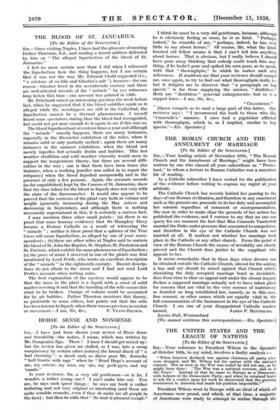THE ROMAN CHURCH AND THE ANNULMENT OF MARRIAGE
[To the Editor of the SPECTATOR' Sin,—Your leading article of November 27th, " The Roman Church and the Annulment of Marriage," might have been written by one who classed all your subscribers as " Protes- tant," to whom a lecture to Roman Catholics was a succulent bit of reading.
As a Catholic subscriber I have waited for the publication of the evidence before writing to express my regret at your attitude.
The Catholic Church has records behind her passing to the days of our Roman civilization, and therefore in any enactment such as the present one proceeds to do her duty and accomplish her mission regardless of comment or misrepresentation. She now in order to make clear the grounds of her action has published the evidence, and I venture to say that no one can query for one moment the fact that Miss Consuelo Vanderbilt married the Duke under pressure that amounted to compulsion, and therefore in the eye of the Catholic Church was not married at all. It matters not whether her marriage took place in the Catholic or any other church. From the point of view of the Roman Church the causes of invalidity are dearly proved and the Church does justice to the suppliant who appeals to her.
It seems remarkable that in these days when divorce can be obtained outside the Catholic Church, almost for the asking, a hue and cry should be raised against that Church which, cherishing the duly accepted marriage bond as inviolable, does from time to time on appeal and under the closest inquiry declare a supposed marriage actually not to have taken place for reasons that are vital to the very essence of matrimony as founded on long established law, namely, as in this case, free consent, or other causes which are equally vital to the full consummation of the Sacrament in the eye of the Catholic Church. I am one of your disappointed Catholic readers [We cannot continue this correspondence.—ED. Spectator.]














































 Previous page
Previous page